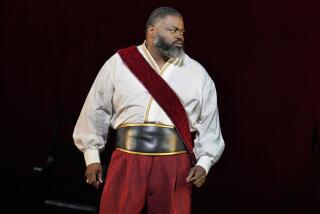‘Ravenshead’: Intricate Tale of Doomed Sailor
- Share via
“Ravenshead”--with music by Steve Mackey and words and an unforgettable theatrical performance by Rinde Eckert--is something new. It is an opera about an outsider that is so true to its subject that it, in its structure and in its very dramatic essence, is outsider opera itself.
A touring work written for Eckert and the six-piece Paul Dresher Ensemble Electro-Acoustic Band, it had its premiere in the fall of 1998 at Penn State and has set down in various East and West Coast venues, but--inexplicably--not as part of any of the major festivals. UCLA presented it for one night in the Freud Playhouse Friday. It is a shame not to have it for a month, as did the Berkeley Repertory Theatre (a co-commissioner along with Penn State) last year.
The idea for “Ravenshead,” the peculiar adventure of Donald Crowhurst, is strong and has attracted others: It also inspired Robert Stone’s celebrated novel, “Outerbridge Reach.” Driven by a need to prove himself and the lure of media attention, Crowhurst, a brave and very foolish British businessman, entered a race around the world on a raft in 1968.
Though a careless and inexperienced sailor, he expected to outsmart the sea. And once his voyage inevitably started going badly, he took a shortcut and concocted a false log. He knew he could easily be unmasked but figured that if he finished second instead of first no one would bother with him, and he would save face. To lose is to win, he reasoned. But, one by one, all his competition dropped out, and Crowhurst, after 243 days at sea, had become unhinged. He wrote in his diary that it had been a good game and jumped.
Eckert--who performs the opera on an ingenious and beautiful set by Alexander V. Nichols that is ship, coffin and, early in the opera, saloon all in one--follows in his libretto the outline of Crowhurst’s saga as fascinatingly documented in Nicholas Tomalin’s and Ron Hall’s 1970 book, “The Strange Last Voyage of Donald Crowhurst.” But he also invents, turning Crowhurst into the vulnerable, affable, tragicomic Richard Ravenshead, whose voyage becomes one of self-awareness as the sea strips away all illusions about himself.
Eckert has a highly developed sense of irony and is a performance artist with a flair for cathartic expression. He also has a voice that is indescribable. Its foundation is a fine, trained operatic tenor. But he expands up (an octave of hair-raising falsetto) and down to an extension of 3 1/2 octaves. “Ravenshead” is spoken and sung, and Eckert’s speaking style is so varied and modulated that the transition between speech and song is a natural continuum. Eckert is also an inspired actor. Indeed, his performance is brilliant on every level; his Ravenshead, the business man who is all hubris but also deeply vulnerable, entertains us, amazes us and shatters us.
Another remarkable aspect of “Ravenshead,” and the one that makes it suitable for opera, is that it depicts two heroic voyages simultaneously. There is the inevitable tragedy at sea but there is also the interior voyage, which is a striking battle between Ravenshead’s angels and devils. The opera begins with a hilarious, boastful aria in which Richard Ravenshead exults on the mathematical ramifications of his 17-letter, prime-number aspect of his name. It then proceeds emotionally back and forth--a touching phone call to his wife where his defenses begin to break, a jolly sea shanty as he sets out on “a church-going Sunday into a natural air,” a falsetto “rage” aria in which the ever-present noise of the sea batters his sanity.
Operas turn on music, not words or theater. But that may not be the case with “Ravenshead”--one hearing was not enough to say. Mackey is an unusual composer--an electric guitarist with a rock background, an early-music lutenist, an academic with a prestigious teaching position at Princeton. “Ravenshead” is an intricate mix of competing music. Mackey provides Eckert and Dresher’s virtuosic band of guitar, violin, saxophone, keyboards and percussion with exciting challenges. Weird scales and harmonies, along with uncomfortable rhythms, keep the listener off balance. There is the energy of rock music.
It is music that sets the stage for drama, but Eckert’s individuality and Tony Taccone’s vivid staging overpower it. Listening to a CD of a live performance does, however, reveal hidden strengths.
It may be too soon to say whether “Ravenshead” will ultimately hold up as opera beyond this inspired production or whether it is perishable performance art. But whatever it is, it is astonishing.
More to Read
The biggest entertainment stories
Get our big stories about Hollywood, film, television, music, arts, culture and more right in your inbox as soon as they publish.
You may occasionally receive promotional content from the Los Angeles Times.











